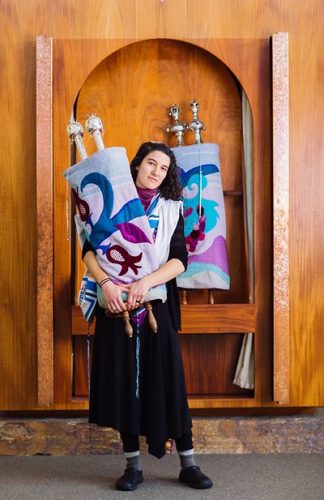
The chairs were organized in circles in the library of Eugene’s Temple Beth Israel, and the congregation was chatting, swelling the sound of their collective conversation. But as the rabbi entered, singing, the talking quickly faded and everyone began to take their seats.
It was the beginning of the havdalah, meaning distinction, a ritual that marks the end of holy time and transition back into ordinary life at the end of Shabbat or Sabbath, Judaism’s day of rest.
Rabbi Ruhi Sophia Motzkin Rubenstein was recently appointed head rabbi of this Eugene congregation that serves about 350 households in the area. Rubenstein was singing a niggun, a wordless melody intoned by a group or congregation. The niggun is meant to bring them to a place of meditation, she says.
Rubenstein led the congregation of Beth Israel this way for the next 30 minutes, with short intervals of silence every 10 minutes. The choir would grow louder with repetition and then suddenly go quiet.
Rabbi Rubenstein is the first woman to head the synagogue on 29th and University, but she says it’s very common in the Reconstructionist Judaism movement for women to be rabbis.
“Both of my parents are rabbis of different liberal movements,” she says. “In a sense, I’m not trailblazing at all. I had a mother who was a rabbi.”
Rubenstein says that, for the most part, the Orthodox movement doesn’t ordain women. Both her parents are Reform rabbis and her husband, Jacob Siegel, is a Modern Orthodox rabbinical student.
Brought up in Saratoga Springs, New York, a smaller city like Eugene, Rubenstein recently moved to Lane County from Manhattan, where she’d spent the past two years.
“Growing up as a part of a visibly Jewish family in a small, predominantly Christian town, I’m sort of comfortable in the ‘token Jew’ role,” she says. “Actually, it’s much more like my upbringing, which is much more comfortable for me than the big city was.”
Rubenstein says she loves Eugene, along with its bike and food culture. She likes to think of herself and her husband as wanna-be homesteaders; the couple was canning tomatoes in their tiny apartment before moving to Eugene.
“We’re just over the moon to have our own garden and space for big cooking projects,” Rubenstein says. “We really like those sort of communal ethos of coming together and singing together and eating together and celebrating.”
Community is a powerful thread running through Rubenstein’s work. In fact, she says a strong sense of community is one of the most wonderfully countercultural things about Judaism. In order to say all the prayers in a worship service, a quorum of 10 people must be present. Although people may be able to worship on their own, Rubenstein says, you can’t undergo a full worship experience unless you’re part of a community.
“The idea that we are not just here to pursue our own highest individual goals or our own highest individual aspirations, but that we’re here to create a holy system of community that is larger than ourselves, that’s a really core important piece of Judaism,” she explains.
The congregation at Beth Israel is affiliated with the Reconstructionist movement, one of five major Jewish movements in the U.S. “A liberal congregation is a congregation that tends to be more embracing of the values of the contemporary culture in which it’s embedded,” Rubenstein says. “For better or worse, liberal congregations are the movements that have a lot more interplay and a lot more diffusion with the majority culture.”
A third generation rabbi, Rubenstein is part of a family with a legacy of activism. Her grandfather was arrested along with 15 other rabbis in a civil rights demonstration in St. Augustine, Florida, after Dr. Martin Luther King Jr. invited them to try to help integrate a swimming pool and hotel restaurant there. In a joint letter issued by the group of rabbis that included Rubenstein’s grandfather, they wrote: “We came as Jews who remember the millions of faceless people who stood quietly, watching the smoke rise from Hitler’s crematoria. We came because we know that, second only to silence, the greatest danger to man is loss of faith in man’s capacity to act.”
Rubenstein says she grew up with a strong sense that being a Jew meant putting yourself on the front lines of the justice battle. She began her own experience in activism in junior high in a small, predominantly conservative town, where she says the most visible battle was for LGBTQ equality.
While attending Smith College in Massachusetts, Rubenstein walked across the state with an interfaith group to raise awareness around climate change. “There was a blizzard,” she recalls, “and it was also the beginning of spring break at the University of Massachusetts. UMASS students who are stuck in traffic, trying to drive wherever they want to go for spring break, through a blizzard, are honking at us and yelling, ‘We want climate change.’”-
Environmental advocacy and climate change remain important issues for Rubenstein. “I really think it’s the biggest threat to humanity right now,” she says.
As the night nears its end, the congregation at Beth Israel prepares to mark this week’s havdalah, which is the end of the Sabbath. The Jewish Sabbath traditionally runs from sunset on Friday until three stars are seen on Saturday night.
Rubenstein says it’s worth recognizing this day of rest and spiritual enrichment that is an important part of Judaism.
“We have this day once a week where we are supposed to be at peace with the way the world is,” she says. “We’re supposed to unplug from technology, unplug from the work of changing how things are, making things better, building things, destroying things and just appreciate the world as it is,” she adds.
“That’s a very countercultural message,” Rubenstein says. “The world might be OK for a day if we stop working.”